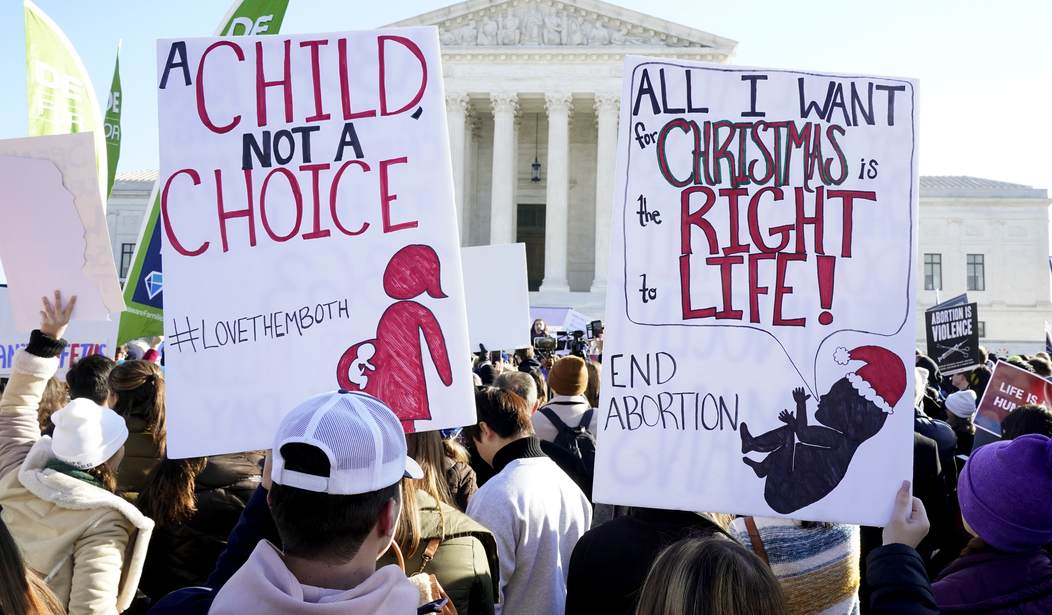On Wednesday, the editorial board of the Wall Street Journal published a piece urging the Supreme Court of the United States to overturn Roe v. Wade and return the issue of abortion to the states. In 1973, Roe gave American women the right to obtain an abortion.
As I’ve covered for Townhall, the Supreme Court heard oral arguments in December for the case Dobbs v. Jackson Women’s Health Organization, which surrounds the constitutionality of a 15-week abortion ban in Mississippi. Following the oral arguments, reports indicated that the Justices were considering letting Mississippi’s law stand and overturning Roe.
WSJ argued that abortion should go back to the states and outlined which Justices will likely be inclined to overturn Roe.
"Judging from the Dec. 1 oral argument in Dobbs, the three liberal Justices would bar the Mississippi law that bans abortion after 15 weeks as a violation of Roe and Casey. Justices Thomas, Neil Gorsuch and Samuel Alito are likely votes to sustain the law and overturn both precedents. Justices Kavanaugh and Barrett seemed, in their questioning, to side with the three conservatives.
But Chief Justice John Roberts tried during the oral argument to find a middle way. He appeared to want to sustain the Mississippi law on grounds that it doesn’t violate Casey’s test of whether there is an “undue burden” on the ability to obtain an abortion. If he pulls another Justice to his side, he could write the plurality opinion that controls in a 6-3 decision. If he can’t, then Justice Thomas would assign the opinion and the vote could be 5-4. Our guess is that Justice Alito would then get the assignment.
The Justices first declare their votes on a case during their private conference after oral argument, but they can change their mind. That’s what the Chief did in the ObamaCare case in 2012, much to the dismay of the other conservatives. He may be trying to turn another Justice now.
We hope he doesn’t succeed—for the good of the Court and the country. The Chief’s middle ground might be explainable with some legal dexterity, but it would prolong the Court’s abortion agony. Critics on the left would still lambaste the Court for letting Mississippi’s law stand. And states would soon pass more laws with even narrower restrictions that would eventually force the Justices to overturn Roe and Casey or say the precedents stand on solid ground.
Far better for the Court to leave the thicket of abortion regulation and return the issue to the states. A political uproar would ensue, but then voters would decide on abortion policy through elections—starting in November."
Recommended
The WSJ editorial board acknowledged that abortion would not disappear entirely if the Court is overturns Roe, but several states have “trigger laws” in place to immediately outlaw abortion if it does.
“The ability to obtain an abortion would not disappear across the U.S. It might in some states, but in some of those states there are already relatively few clinics that perform abortions. The likeliest result is a multiplicity of laws depending on how the debate and elections go. California might allow abortion until the moment of birth. Mississippi might ban it except in cases of rape or incest.
The Guttmacher Institute, which favors abortion rights, estimates that 26 states ‘are certain or likely to ban abortion without Roe.’ But that means 24 states would allow it, including some of the most populous. Based on a Guttmacher analysis from 2017 on abortions performed in various states, the majority of those abortions would remain legal.”
Several liberal states, including Washington, California, Maryland and Colorado have pushed legislation to expand abortion in the event Roe is overturned. On the other hand, Texas, Oklahoma, Florida, Idaho, Texas, South Dakota and Arizona have enacted laws to protect unborn lives.
“In Dobbs the Court can say that such a profound moral question should be decided by the people, not by nine unelected judges,” the WSJ editorial board concluded.
Since Roe became law of the land in 1973, an estimated 62 million abortions have occured in the United States, according to National Right to Life Committee.
In her Dobbs amicus brief filed last summer, Mississippi Attorney General Lynn Fitch wrote that both Roe and Planned Parenthood v. Casey are “egregiously wrong.”
“The conclusion that abortion is a constitutional right has no basis in text, structure, history, or tradition,” Fitch said in the brief. “So the question becomes whether this Court should overrule those decisions. It should.”
A decision is expected this summer.

























Join the conversation as a VIP Member